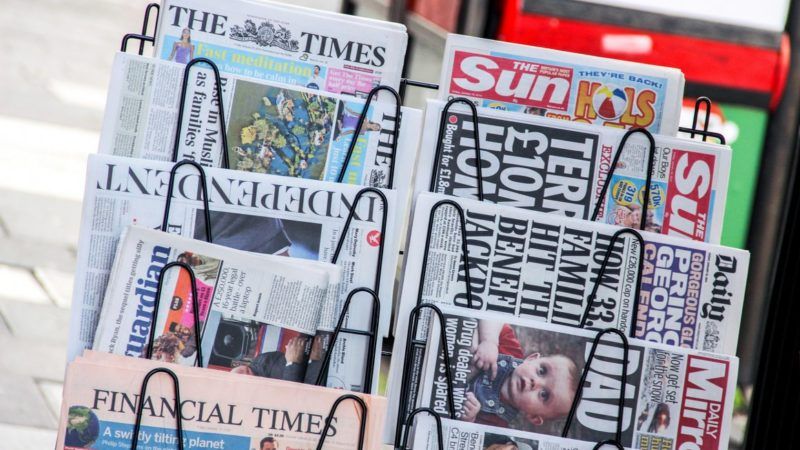U.K. Media Lobby Wants Government To Force Advertisers to Support Coronavirus Coverage
Desperate for revenue, online outlets try to use a crisis to overrule their customers’ judgment.

Does your local grocery store prefer not to advertise next to a news story documenting the latest coronavirus deaths? Tough, say the British media and government.
The COVID-19 pandemic has created a crisis for many media outlets. People are reading more news to track what's been happening, but business shutdowns are killing off a lot of advertising. The advertisers that remain can be finicky about where their ads are placed: Some don't want to have their products or services connected to bad news. But bad news brings eyeballs. Media outlets want to make money off the coronavirus-related stories that are driving so much traffic, but these advertisers block ads from articles that contain certain words, such as "death."
Media lobbyists in the United Kingdom think publications there are losing as much as £50 million (about $62 million) because of this. Those lobbyists are pushing the U.K. government to encourage, and even possibly require, advertisers to let their ads be put next to coronavirus stories.
The Guardian reports:
The culture secretary, Oliver Dowden, said trusted news outlets are a "fourth emergency service at this time because they provide independent, verifiable news and information to the public" and need to be saved, according to a letter seen by the Guardian.
He said new guidelines on how to reduce the impact of the blocklists on news outlets were issued by trade bodies last month but had not yet been widely implemented.
"If the uptake of industry guidance is not shown to have a rapid impact, the government will have to consider all possible options in the interests of promoting critical public service news at this time of national emergency," said Dowden in the message to leading brands, advertising agencies, and tech platforms.
The Guardian notes that it's "unclear" how exactly the government could force advertisers to put ads where they don't want them. But given that Parliament didn't see any problems granting the government the authority to pretty much control the movement and behavior of everybody in the United Kingdom during the pandemic, advertisers should be concerned.
It would be a tremendous violation of advertisers' speech rights to force them to put their ads in places where they don't want them to be. And if advertisers truly didn't want their products or services connected to these stories, wouldn't the likely response be to cut back on online advertising?
And then what? Would the British government start forcing businesses to advertise? Could an advertiser be forced to promote its product or service next to clickbait op-eds designed to enrage and polarize? Could a business be required to underwrite coverage the business believes includes inaccurate information?
What's particularly rich is that U.K. nannies have been fighting for years to stop advertisements for what it deems "junk food," to fight an alleged "childhood obesity epidemic." This government push has most assuredly meant a loss of advertising revenue for British media outlets. Now the U.K. has an actual epidemic on its hands, and so some leaders want to mandate ad placement.
They should just butt out. Let the media industry make its case to the advertisers. If advertisers are still reluctant, it's not the government's place to force the issue.
Editor's Note: As of February 29, 2024, commenting privileges on reason.com posts are limited to Reason Plus subscribers. Past commenters are grandfathered in for a temporary period. Subscribe here to preserve your ability to comment. Your Reason Plus subscription also gives you an ad-free version of reason.com, along with full access to the digital edition and archives of Reason magazine. We request that comments be civil and on-topic. We do not moderate or assume any responsibility for comments, which are owned by the readers who post them. Comments do not represent the views of reason.com or Reason Foundation. We reserve the right to delete any comment and ban commenters for any reason at any time. Comments may only be edited within 5 minutes of posting. Report abuses.
Please to post comments


So how do you like your 30 day free trial of socialism?
Thirty day? It's now day 25 for me, and it looks like at least another 30 before I'm allowed out of my house.
“Independent, vérifiable news...”
L. O. L.
The media are acting as parrots for government edict. Nothing more. If it’s not said politician, or some epidemiological opinion that is politician-approved, it’s not being reported by any mainstream news, and neither by most others.
Perhaps the reason these advertisers have to be forced is they don't buy the Imperial College's flawed computer model panic.
Maybe the media outlets should stop flooding people with useless sob stories about people getting sick so advertisers won't get scared away? Surely there is something else happening in the world.
It is cute that Shackford thinks that the British political class believes that there is a right to free speech and press that the government is bound to protect. It is more an ideal than a rule for their government.
Maybe they should sell ad space to a different set of businesses: funeral homes, casket makers and cemeteries.